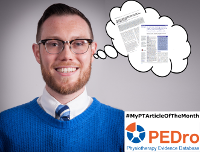
Darren Brown is a clinician and academic from Chelsea and Westminster Hospital National Health Service (NHS) Foundation Trust in London, United Kingdom who specialises in the treatment of Human Immunodeficiency Virus (HIV). Chelsea and Westminster Hospital NHS Foundation Trust is the largest HIV unit in Europe, and Darren leads the physiotherapy service providing interventions in both inpatient and outpatient settings for adults living with HIV. Darren champions and advocates for the role of physiotherapy across the continuum of care for HIV at local, national and international levels. He is the HIV/AIDS special interest coordinator of World Confederation for Physical Therapy (WCPT) Subgroup IPT-HOPE, WCPT Congress Programme Committee member for Geneva WCPT 2019, vice-chair of the UK Rehabilitation in HIV Association, and member of Canada-International HIV Rehabilitation Research collaborative.
For the 36.9 million people living with HIV globally, effective treatment offers normal life expectancy. Consequently people living with HIV surviving past 50 years of age are increasing unprecedented rates. As people live longer with chronic HIV infection, they are susceptible to health conditions arising from the underlying infection, potential side effects of treatments, and ageing. Cardiovascular disease is a common comorbidity. Rehabilitation recommendations to address disability experienced by people living with HIV include aerobic and progressive resistance exercise. Darren has recently read two research articles on this topic.
This meta-analysis of randomised controlled trials evaluated the effect of aerobic and resistance exercise alone, and in combination, for people living with HIV. Cardiovascular outcomes included VO2max, 6 Minute Walk Test, maximum heart rate, resting heart rate, systolic and diastolic blood pressure, and maximum power output. Darren says: “This is the first time that meta-analysis has been used to evaluate the effects of exercise on the 6 Minute Walk Test. The review also performed subgroup analysis on the role of exercise type, professional supervision, exercise frequency and duration, control groups and study quality.” Results indicate that, in comparison to the control conditions, there were moderate and large effect sizes in favour of exercise interventions for VO2max and 6 Minute Walk Test, respectively. Combined aerobic and resistive exercises had a larger effect size compared to aerobic exercise alone. Effect sizes were also larger for exercise programs with a dose of at least 3 sessions/week for at least 150min/week. Darren says: “This research has important implications for physiotherapists globally who can support people living with HIV to exercise. Combining aerobic and resistance exercise will give people living with HIV a protective factor against comorbidities related to ageing, cardiovascular disease, or HIV infection. The 6 Minute Walk Test can be used to monitor progress.”
This qualitative study used face-to-face semi-structured interviews to explore readiness to engage in exercise among adults living with HIV who had two or more comorbidities. The authors developed a framework that describes readiness on a dynamic spectrum, whereby readiness can fluctuate based on many factors (including the complex and episodic nature of living with HIV, social supports, perceptions and beliefs, past experience with exercise, and accessibility). While the framework was developed specifically for people living with HIV and multi-morbidity, it may also be applicable to people living with other chronic and episodic health conditions. Darren says: “Many people living with HIV are not meeting physical activity guidelines, so exploring the readiness to engage in exercise is important for understanding and promoting exercise as a beneficial self-management strategy.”



